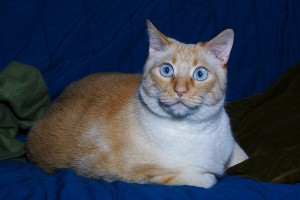barely, scarcely
[adverb]
[ter-nau-wer-nood] ![]()
The adverb ‘ternauwernood’ originated in the form ‘ter nauwer nood’. The adjective ‘nauw’ here has the meaning of ‘leaving very little space’, so that ‘ter nauwer nood’ is a situation of distress (‘nood’) you can hardly get out of (or avoid). (The adjective ‘nauw’ commonly translates as ‘narrow’. ‘Ter’ means ‘in the’ in this case). Later the three words were combined into one, and the meaning is now a more general ‘barely/scarcely’ or ‘just’ (as in ‘just made it’). However, one mostly uses ‘ternauwernood’ when there are somewhat serious consequences involved.
Note that ‘ter nauwer nood’ is an example of the use of the dative case in Dutch; the use of cases nowadays is rare and one mostly encounters its usage in fixed expressions/compounds.
Examples:
– “De impala wist ternauwernood aan de leeuw te ontkomen.”
(“The impala barely escaped the lion.” Lit. “managed to barely escape the lion”. Note the verb ‘ontkomen aan’: to escape, to evade. In general one can translate ‘ternauwernood ontkomen’ as ‘it is/was a narrow escape’.)
– “Ik heb ternauwernood de trein gehaald; als ik hem gemist had, dan was ik te laat gekomen op mijn sollicitatiegesprek.” – “Ja jongen, je had ook gewoon wat eerder van huis kunnen gaan hè; hoe vaak heeft mamma het nu al tegen je gezegd…”
(“I barely caught the train; had I missed it I would have been late for my job interview.” – “Well my boy / son, or you could have (just as easily) left home a little bit earlier, well (am I right)? How many times has your mother told you this…”)
– “Het echtpaar heeft de frontale botsing ternauwernood overleefd. Volgens de politie is het een wonder dat er niet meer slachtoffers zijn gevallen.”
(“The married couple barely survived the head-on collision. The policy say it is a miracle that there are no further casualties.” Note that although somewhat redundant, it is common to use the verb ‘vallen’ when talking about victims or casualties as a result of some action.)
Expressions:
– “In het nauw zitten(/komen)”: to be(/end up) in a tight spot.
Related words:
– Nauw: narrow [adjective].
– Nauw: distress, tight spot/corner [noun] [het nauw, <no plural>].
– Nauwelijks: barely, hardly [adverb].
Example:
– “Hoe durf je zo te klagen; er zijn kinderen op deze wereld die nauwelijks genoeg te eten hebben!”
(“How dare you complain like this; there are children in this world who hardly have enough to eat!”)
– Nood: distress [noun] [de nood, de noden].
– Net: just, barely [adverb].
Things to remember from this DWOTD
– The meaning of ‘a frontale botsing’;
– The use of the verb ‘vallen’ in ‘er zijn slachtoffers gevallen’;
– The meaning of the adjective ‘nauw’ versus the noun ‘nauw’.

 ‘Blauwbekken’ is what you do when you’re standing outside in the cold shivering. However sometimes you can also use it in other situations, just to emphasize how cold you are!! The word ‘bek’ is slang for ‘mouth’ and sometimes even ‘face’. And I guess you can figure out ‘blauw’. If not, go outside without a jacket (if in NL) and come back in an hour 😉
‘Blauwbekken’ is what you do when you’re standing outside in the cold shivering. However sometimes you can also use it in other situations, just to emphasize how cold you are!! The word ‘bek’ is slang for ‘mouth’ and sometimes even ‘face’. And I guess you can figure out ‘blauw’. If not, go outside without a jacket (if in NL) and come back in an hour 😉 ‘Koffiedik kijken’ is a form of ‘
‘Koffiedik kijken’ is a form of ‘ Surprise, the DWOTD is back 🙂 After 2,5 months of chasing building constructors I have almost shooed the last one away (but not without delivering what was agreed 😉 ). And I realized that one shouldn’t wait with starting one’s new life until all external issues have been resolved. So the DWOTD is back. Time to start practicing your Dutch again!!
Surprise, the DWOTD is back 🙂 After 2,5 months of chasing building constructors I have almost shooed the last one away (but not without delivering what was agreed 😉 ). And I realized that one shouldn’t wait with starting one’s new life until all external issues have been resolved. So the DWOTD is back. Time to start practicing your Dutch again!! Literally ‘promise makes debt’ this phrase says that one ought to keep one’s promise. It’s often used during arguments or when emphasizing that it is in fact a promise one is living up to.
Literally ‘promise makes debt’ this phrase says that one ought to keep one’s promise. It’s often used during arguments or when emphasizing that it is in fact a promise one is living up to.